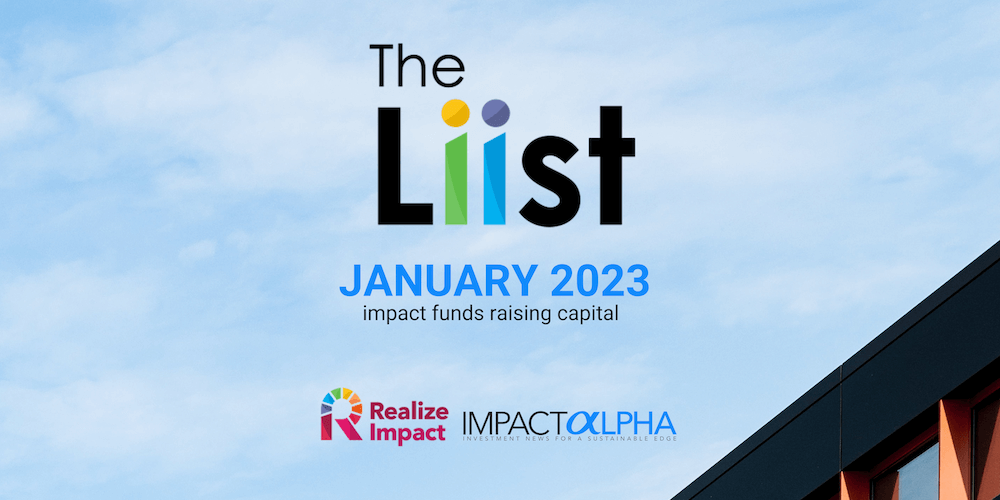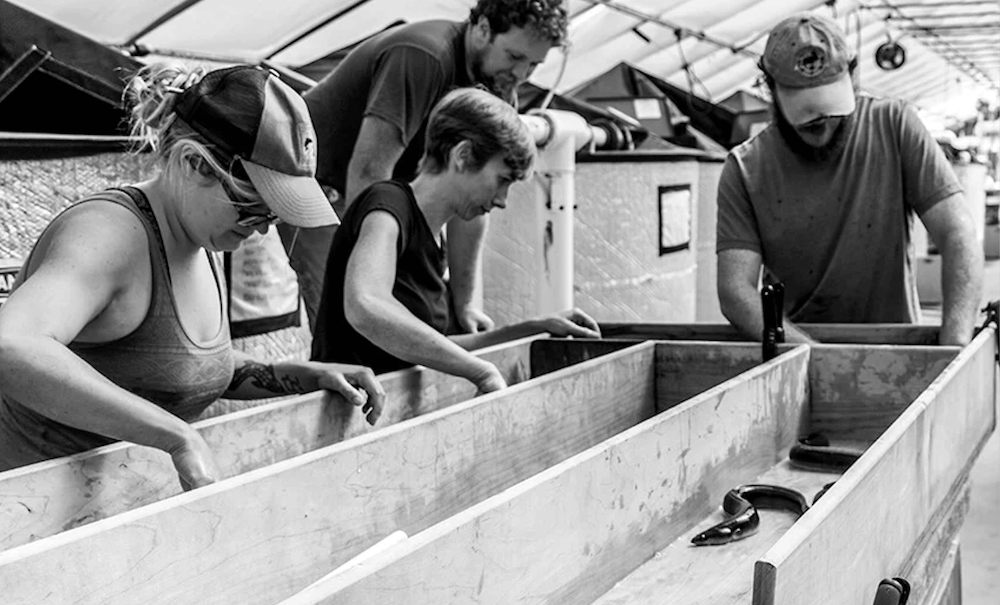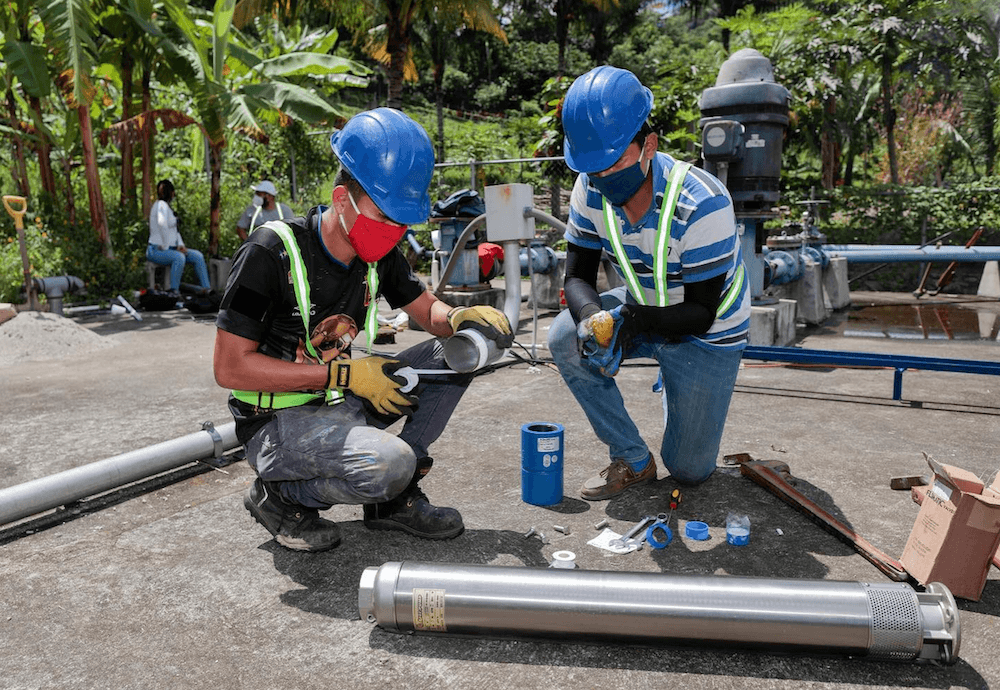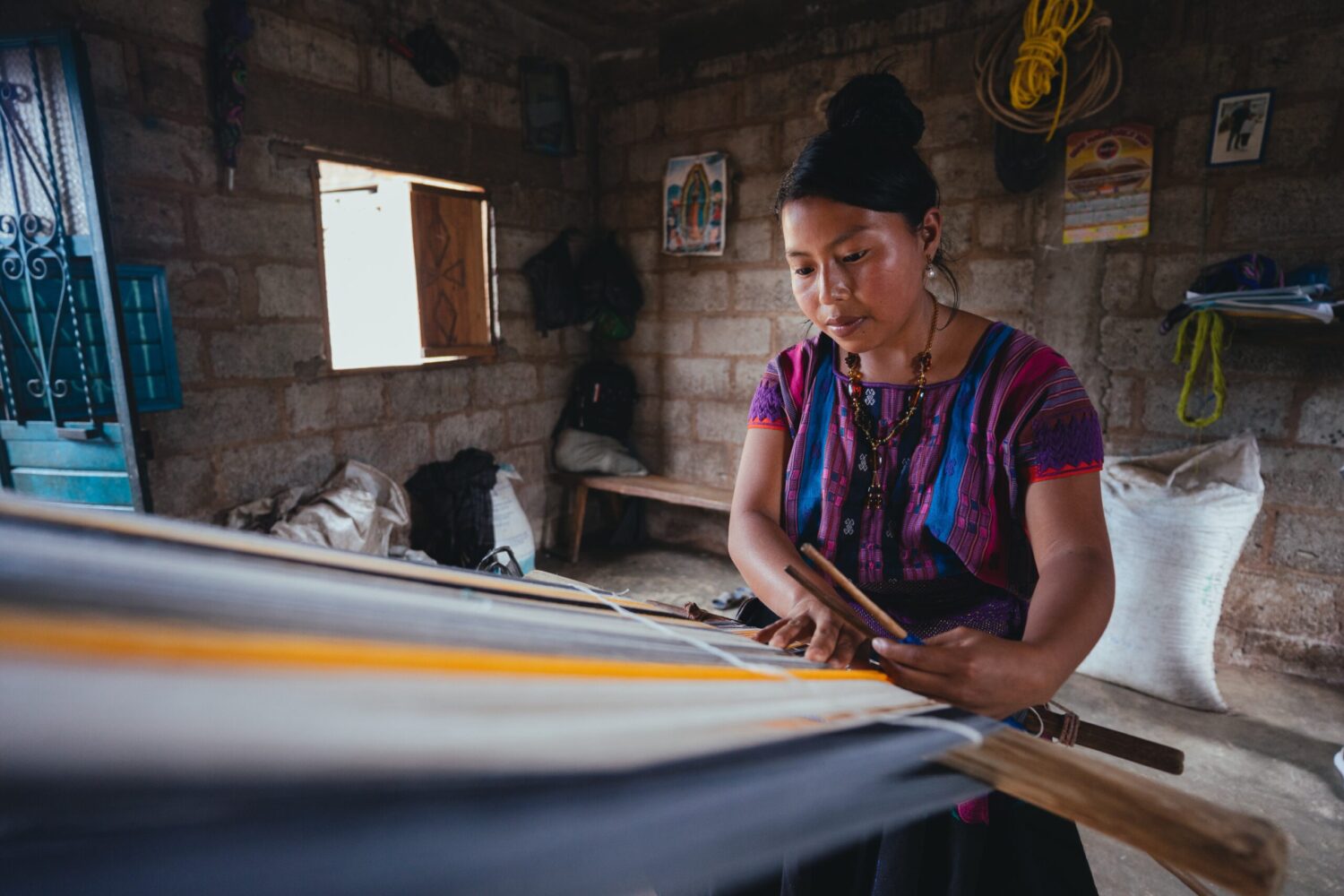ImpactAlpha, January 3 – Welcome to the first Liist of 2023! This month’s Liist, in partnership with Realize Impact, features seven funds investing in inclusive communities, high-impact technologies, and for the preservation and restoration of natural resources.
Local impact. Senegal-based WIC Capital is leveraging the investment power of women in business, as well as local and international investors, to support female entrepreneurs while creating jobs and driving local economic engines. TAS in Canada is supporting real estate projects that drive local and equitable value-creation.
Impact tech. Bangalore-based Menterra is raising a second fund to back early-stage impact tech startups addressing India’s healthcare, education and agriculture needs. TEAMFund in the U.S. is zeroing in on technologies meeting the healthcare needs of underserved patients and over-stretched health systems in the U.S., India and Africa.
Climate and natural capital. Blackhorn Ventures in Colorado is raising its second Industrial Impact Fund to green resource- and carbon-intensive industries like transportation, energy and real estate. Climate Asset Management in the U.K. is in the market with two strategies that aim to restore, preserve and cultivate value from natural resources in Europe and emerging markets.
Also on this month’s Liist: Upstart Co-Lab’s new Inclusive Creative Economy Strategy, that aims to funnel capital from investors and foundations to entrepreneurs in the U.S.’s creative industries.
- WIC Capital (women-led and -focused fund investing in small businesses in Senegal)
- Blackhorn Ventures Industrial Impact Fund II (Colorado-based VC firm investing to green heavy industries)
- TAS Impact Development LP4 (Canada-based real estate impact fund)
- Upstart Co-Lab (impact investing vehicle for U.S. creative economy enterprises)
- Menterra Social Impact Fund II (India-based investment fund for high-impact tech startups)
- TEAMFund (investment fund for health tech benefitting underserved patients in the U.S., Africa and India)
- Climate Asset Management’s Natural Capital Strategy and Nature Based Carbon Strategy (Luxembourg-domiciled funds focusing on regenerative agriculture and carbon-credit projects)
Disclaimer: The LiiST and this post are based on available information, sourced by ImpactAlpha and our partner on The Liist, Realize Impact. Information has not been further reviewed by the managers nor verified by third parties, is not guaranteed for accuracy or completeness, and should not be relied upon as investment advice or recommendations. Nothing in The LiiST, this post or on ImpactAlpha.com shall constitute an offer to sell or the solicitation of an offer to buy securities.

WIC Capital is addressing Senegal’s small business financing gap while empowering female investors and women-led businesses. The Dakar-based investment firm provides equity and quasi-equity capital to female founders who are providing or improving in-demand products and services. Portfolio company Calinounou is fighting unfair pay and working conditions in the home services sector with an online recruitment and booking service. Les Ateliers de Corinne is a woman-led bakery in Dakar with regional expansion plans. Supporting such businesses “will strengthen the African private sector, contributing to job creation, innovation and GDP growth,” WIC Capital’s Evelyne Dioh told ImpactAlpha (learn more, “Mapping the climate edge for gender investors – and vice versa”).
- Open for business. WIC, which stands for Women’s Investment Club, started as a network of female angel investors wanting to support other women’s business ventures. Its investment arm is raising a $20 million investment fund. The Mauritius-domiciled fund has secured $5 million in debt and equity from women in WIC’s angel network, Senegalese insurer Sunu Assurance and Mastercard. USAID, FMO and the Dutch government’s Challenge for Youth Employment provided first-loss capital. Contact Evelyne Dioh for more information.

Blackhorn Ventures is a Colorado-based venture capital fund focused on greening resource-intensive sectors like transportation, energy and real estate, as well as supply chains, in the U.S. “Emission intensity is directly correlated with resource use and resource efficiency,” the company says. It’s “pursuing the most direct and effective way to combat climate, economic and political destabilization that may result from climate change, resource degradation and unavailability, and ecological system collapse.” Blackhorn makes debt and equity investments of $500,000 to $7 million in seed and Series A-stage companies in North America, as well as Europe and Oceania in cases where there’s a U.S. expansion strategy.
- Second fund. The firm is looking to raise $200 million from accredited investors for its second impact fund. It has so far raised $60 million and made 11 investments. One example: Seattle-based Electric Era makes modular electric vehicle batteries and a smart charging system to accelerate fast EV charging infrastructure. Blackhorn Ventures Industrial Impact Fund II is domiciled in Delaware. Contact Melissa Cheong for more information.

Toronto-based TAS is a social and environmental justice-focused impact firm that invests in real estate projects in Canada. “We are tackling climate change, broadening affordability and equity, and building social capital to create neighborhoods– and ultimately cities – where people thrive and belong,” the firm says. The firm is looking to raise $300 million from accredited investors for its fourth fund, TAS Impact Development LP4.
- Impact strategy. TAS acquires unzoned land and looks to drive value creation and impact through the land entitlement and development process as well as refurbishment and leasing. The first investment from its fourth fund is a site in the Toronto metro area that it will develop in an affordable commercial and residential property. TAS is looking to achieve net-zero carbon emissions with all of the fund’s investments. The firm will track impact using the Task Force on Climate-related Financial Disclosures’ framework.
- Open for business. TAS has been investing in Canadian real estate since raising its first fund in 2013. Its fourth impact fund is domiciled in Canada and has so far raised $113 million. Contact Jane Chan for more information.

New York-based Upstart Co-Lab was launched seven years ago by Laura Callanan, the former top official for the National Endowment for the Arts, to get investors to spot the investment—and impact—opportunity of the creative economy. Creative industries drive 5% of the U.S. economy alone. The nonprofit organization’s new $100 million pooled investment vehicle will enable Upstart Co-Lab to directly help investors capitalize on those opportunities. The Inclusive Creative Economy Strategy will back U.S.-based fund managers and enterprises in the creative industries that are led by women and people of color and which are building livelihoods and inclusive communities. The vehicle uses a multi-donor fund structure, through ImpactAssets, to raise program-related investments and recoverable grants from foundations, as well as investments from donor-advised funds and public charities.
- Learn more. Read “Upstart Co-Lab’s pipeline of creative economy deals is now an investable impact strategy,” on ImpactAlpha.

Menterra has been investing in India’s high-impact tech startups since 2016, when it spun out of impact accelerator Villgro. More than 80% of impact capital in India focuses on later-stage companies. Bangalore-based Menterra uses a blend of commercial and patient capital to plug the early-stage capital gap for founders addressing challenges in agriculture, healthcare and education. It is looking to raise $100 million for its second impact fund to make equity and quasi-equity investments. Fifteen percent of the fund will invest in seed-stage companies, while the majority will invest in Series A rounds.
- Track record. Menterra’s first fund, which largely focuses on hardware startups, made 12 investments and has notched two exits. An early investment, low-costs health diagnostics tech developer Biosense Technologies, was acquired by diagnostics manufacturer Tulip in 2019. Menterra has teed up three investments for its second fund: Iron Kettle, which supports smallholder tea growers; cancer tech venture TeraLumen; and career support platform I Dream Career. Menterra operates an accelerator program to support its portfolio businesses.
- Open for business. Menterra’s second fund has so far raised $30 million from the Lemelson Foundation, as well as a U.K.-based family office, a fund of funds backed by the Indian government and several high net worth individuals. The fund is domiciled in India. Contact Mukesh Sharma for more information.

Healthcare systems worldwide are being put under pressure by a rise in non-communicable diseases, like diabetes and healthcare. Nonprofit organization TEAMFund is working to minimize strain by investing in medical and digital health technologies that “improve the accessibility, affordability, and quality of care for underserved patient populations.” It focuses in particular on entrepreneurs who have experienced first-hand the issues their companies are addressing. Massachusetts-based JanaCare makes a low-cost diagnostic and monitoring device for diseases like diabetes that can plug into a smartphone. Egypt’s Vezeeta is an online booking site for patients needing appointments with doctors, dentists and other health specialists. TEAMFund invests in companies serving patients in the U.S., India and Africa.
- Second fund. TEAMFund started with a $30 million first fund that was backed by Merck, Boston Scientific, the Sorenson and Lemelson foundations and other investors. Its second fund is looking to raise $150 million from accredited investors to build on TEAMFund’s original thesis. It will make equity and convertible debt investments of between $10 and $15 million. The Delaware-domiciled fund has raised $30 million to date. Contact Yousuf Mazhar for more information.

U.K.-based Climate Asset Management launched in 2020 to prove that protection and restoration of natural resources can be attractive to institutional investors. The firm, which was launched in partnership between HSBC Asset Management and climate investor Pollination, is looking to raise $1.6 billion across two Luxembourg-domiciled funds. It has so far raised $650 million, roughly evenly split between the two funds.
- Regenerative agriculture. Capital Asset Management’s Natural Capital Strategy is aiming to raise $1 billion to acquire land parcels in advanced economies to restore for regenerative agriculture and agroforestry. Its first investment is a 1,000-acre parcel of farmland in Spain that will be converted into almond and olive fields. HSBC anchored the fund.
- Carbon markets. The Nature Based Carbon Strategy, also anchored by HSBC, will invest in carbon projects in emerging markets. The fund is looking to raise $600 million from corporations looking to access new carbon credits. Rather than acquiring assets, Climate Asset Management will invest in projects owned by local stakeholders and other developers.
- Learn more. Read, “HSBC-backed Climate Asset Management raises $650 million for natural capital funds,” on ImpactAlpha.











